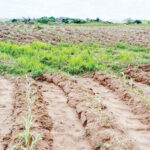Irrigation farmers in Yobe State are in limbo as the high cost of fuel left them at a critical point of production.
Farmers rely on generators to pump water to their farms because the state’s wet season has not yet been fully established.
One of the most crucial inputs for irrigation farming is fuel. In order to supply their crops with water, farmers in the state refuelled the generators that pump water to their farms at filling stations.
Daily Trust spoke with some of the farmers who expressed serious concern and how they intend to handle the issue.
- Remembering Senator Bayo Osinowo
- Customs seized sacks of donkey meat, skin at Kebbi border handed over to NAQS
With the high cost of fertilizer and the price of fuel, farmers have already taken some actions and measures to minimize the crops they are planting, while others have started to stop production.
Some of the farmers who began production prior to the subsidy removal were caught in the middle as their crops were just reaching maturity. Due to the withdrawal, the costs have skyrocketed, with fuel now selling at more than N530 per litre from N195.
Daily Trust learnt that some farmers regretted investing their funds in the production, citing subsidy removal at the critical point of production.
An irrigation farmer, Bashir Bello who is growing onions, tomatoes, cabbage and vegetables used in salads, told Daily Trust that before the subsidy removal, he used N500 to buy fuel to pump water but now he has to spend N1,500.
“After doing the calculation, I just gave up because there is no profit in it. As you know, for perishable food like this we don’t have a fixed price, everything can go down, it’s an uncertain market.
“I just finished calculating that if not because the rainy season is approaching, I will have to leave the farm with the entire crop.
“So as usual, we are calling on the government to consider giving us palliatives to cushion the effect of the subsidy removal as it will affect irrigation farmers who rely on petrol to pump water to their farms,” he said.
Muhammad Lawan Maishinkafa is one of the irrigation farmers in Yobe who are struggling with the new price of fuel to pump water to his crop while still hoping that the rainy season will help his crops to grow well.
“In this matter, we are only praying that God will choose the best for us that will be better than where we are today.
‘‘Although the monsoons have come, the water is still not available properly. That is why we have to buy fuel to power generators to pump water. As you know, crops without water will die, so there is no doubt that the situation we are in is very difficult.
“The crops are growing while the rain has stopped, and there is no money to buy fuel, so the situation is pathetic.
‘‘We used to buy one bag of fertilizer at the cost of N15,000 or N18,000 while others went for N20,000 per bag. Although it is very expensive and we used to buy petrol at the cost of N250 per litre, now the federal government has removed subsidy and we are buying at N550 per litre.
“It’s not easy at all. Sometimes you don’t know what to do. But I am very sure that this situation we are in is a matter of time, Insha Allah it will pass.”
When Daily Trust asked if he and other farmers would increase the price of what they produce, Maishinkafa said: “This is something that only God knows and how the market will determine.’’
Mr. Yahaya Abdullahi, a vegetable farmer such as tomatoes, onions, and lettuce among others, said the situation is not easy at all because his income has not increased but the price of fuel has doubled.
“In the past, I used N1,100 to buy fuel to power generators to pump water for my crops, but yesterday, I used N2,500 to buy fuel and it didn’t finish my work.
“As you know, in the vegetable business, you are not the one who fixes the price, it is the market that will decide how you will sell. The price of these goods will only go up if farmers do not make it available,” he said.
He further said: “The first thing we are going to do is to reduce the size of our farmlands so that a farmer can plant what his pocket can pay for fuel.
‘‘If you are cultivating one field now, you have to take half of the field and cultivate it because you have to calculate what you have and what you can plant.
“The truth is that people are in a predicament. May God make our leaders look at the situation we are in, especially the poor and the farmers,’’ he added.
Daily Trust gathered that some farmers have taken loans of fertilizers and other agricultural inputs which they would pay back when they harvest their crops.
It was also gathered that the increase in the price of fuel has made some farmers sell crops not yet due for harvest.
Usman Muhammad, a farmer of perishable foods, told Daily Trust that the recent situation has left farmers uncertain about their irrigation activities.
“While in the current situation, we are buying a litre of petrol at N550, when the government was subsidising, we used to buy a litre at N250; now it has doubled.
“What we are doing now is managing, because now we have to reduce what we are planting as things are getting worse for the medium-scale farmer.
‘‘Another thing that scares farmers is the uncertain price of what they produce. The price can go up or down at any time. That’s why there is uncertainty,’’ he said.
“Vegetable farmers don’t have a standard price; we will sell at the price the market determines, unlike for millet or rice farmers.
“As I am talking to you, there are farmers who have taken loans from traders with the intention that they will pay back when they sell what they cultivated, but now with the removal of fuel subsidy some farmers are already selling their crops even before they reached the stage of cultivation as they don’t have the money to buy fuel to pump water for their crops,’’ he lamented.

 Join Daily Trust WhatsApp Community For Quick Access To News and Happenings Around You.
Join Daily Trust WhatsApp Community For Quick Access To News and Happenings Around You.


